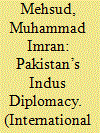|
|
|
Sort Order |
|
|
|
Items / Page
|
|
|
|
|
|
|
| Srl | Item |
| 1 |
ID:
184708


|
|
|
|
|
| Summary/Abstract |
This article pits two diplomatic strategies in competition for policy officials’ support. Distributive strategies promote one party’s goals at the expense of another. Integrative strategies promote goals that are in conflict with those of another state. The focus is strategy choice and strategy’s bargaining potential of less developed countries (LDC) coalitions in the GATT/WTO regime. Amrita Narlikar, whose study of LDC coalitions is relied upon here, finds that many LDC states employ distributive strategy because of asymmetric structure, which emphasizes the gap between LDC and developed state capabilities, yet she critiques that strategy as ineffective in supporting LDC objectives. This disconnect is probed in this article, which concludes that LDC distributive strategy must be improved and that the integrative strategy’s success in attaining LDC objectives can be important enough to override the structural argument for distributive strategy.
|
|
|
|
|
|
|
|
|
|
|
|
|
|
|
|
| 2 |
ID:
184709


|
|
|
|
|
| Summary/Abstract |
This study examines the fundamental causes of intractable conflict and deadlocked negotiation by centering on identity. The cognitive variables of identity are derived, and the causal layered analysis framework is used to analyze the influencing mechanism among cognitive layers. This research assumes that conflicts are influenced by interactions among key variables of the identity frame in the cognitive layer: “ingroup definition,” “outgroup definition,” and “conflict narrative.” The United States–North Korea denuclearization negotiation case is examined using this framework, seeking to understand how these factors influenced the conflict, policy initiatives and negotiations.
|
|
|
|
|
|
|
|
|
|
|
|
|
|
|
|
| 3 |
ID:
184710


|
|
|
|
|
| Summary/Abstract |
This article analyzes six major crises in Pakistan’s Indus diplomacy which shaped Pakistan’s water (in)security vis-à-vis upstream rival India on the Indus river system. These include first, when Pakistan failed to comply with the Standstill Agreement of 1947; second, when it signed the Inter-Dominion Agreement; third, when it acquiesced to the Nehru-Lilienthal-favored functional approach to the Indus water dispute in 1951; fourth, when the World Bank Proposal of 1954 apportioned exclusive use of the Western Rivers to Pakistan and the Eastern Rivers to India, but Pakistan delayed accepting the Proposal; fifth, when India secured rights on the Western Rivers in the Indus Waters Treaty of 1960; and sixth, several challenges that have emerged under the Indus Waters Treaty.
|
|
|
|
|
|
|
|
|
|
|
|
|
|
|
|
| 4 |
ID:
184712


|
|
|
|
|
| Summary/Abstract |
In bilateral relations and negotiations with the European Union (EU), smaller and economically weaker states are often unable to express their national preferences. Despite their limited bargaining power, however, some Eastern Partnership (EaP) countries obtained significant concessions from the EU. This article analyzes the factors that explain EaP states’ unexpected negotiation success in the context of the Deep and Comprehensive Free Trade Agreement (DCFTA) with Ukraine, the Comprehensive and Enhanced Partnership Agreement (CEPA) with Armenia, and enhanced economic partnership with Belarus. We identify negotiation strategies that are crucial to understanding of the puzzle.
|
|
|
|
|
|
|
|
|
|
|
|
|
|
|
|
| 5 |
ID:
184714


|
|
|
|
|
| Summary/Abstract |
This study examines how power impacts parties’ negotiation behaviors. We propose a new conceptualization of power. Since power is largely a matter of perception, and symmetry lies in the eye of the beholder, the parties’ perceptions of power balance, be it symmetry or asymmetry, is highlighted. We relate perception of power balance to negotiation strategies, hypothesizing that in the case of perceived power symmetry, parties’ negotiation behaviors tend to be more competitive and combative, whereas in the case of perceived power asymmetry, the negotiation behaviors are likely to be more cooperative. To test this proposition, a comparative case study is presented.
|
|
|
|
|
|
|
|
|
|
|
|
|
|
|
|
| 6 |
ID:
184711


|
|
|
|
|
| Summary/Abstract |
Grounded in peacebuilding and negotiation literature, we propose a Three Conditions Model that promotes collaborative engagement and can help advance sustainable solutions to complex problems – domestic and international – through self-governing agreements based on the following three conditions: (1) inclusion of, (2) common understanding among, and (3) trust between all prime actors. Collectively, these conditions make the management of complex problems, and of the conflicts arising from them, more effective and sustainable. Using the coronavirus pandemic as an example, we briefly illustrate the nature of complex problems and self-governing agreements, address the inclusion-trust dilemma that mars many negotiations and assess the utility of each condition to address the coronavirus response in the United States more effectively.
|
|
|
|
|
|
|
|
|
|
|
|
|
|
|
|
|
|
|
|
|